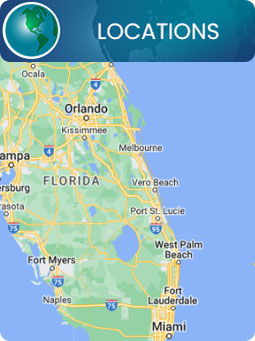Complex Regional Pain Syndrome Specialist
Complex regional pain syndrome (CRPS) is a painful disorder that develops after an injury, such as a fracture, in the arm, hand, leg, or foot. Severe pain, swelling, loss of range of motion, and skin abnormalities are the most common symptoms. Preventing the spread of CRPS involves early diagnosis, comprehensive treatment, and proactive management. Visit us today. Dr. Michael S. Slobasky, DO, DABPMR, and his skilled staff at Global Neuro & Spine Institute will treat you with the appropriate care. For more information, contact us or schedule an appointment online. We have convenient locations in Orlando FL, Jensen Beach FL, Malabar Palm Bay FL, Atlantis FL, Fort Pierce FL, Winter Park FL and Plantation, FL.


Table of Contents:
What is complex regional pain syndrome?
What are the stages of complex regional pain syndrome?
What food should I avoid with CRPS?
How do you stop spreading CRPS?
Complex regional pain syndrome (CRPS) is a medical condition characterized by pain, alterations in skin pigmentation, and various other symptoms that manifest predominantly in a specific region of the body, typically the extremities such as the arm, leg, hand, or foot.
The effects of CRPS on the affected limb can significantly impair its functionality, disrupt sleep patterns, hinder daily activities, and have adverse effects on mental well-being.
Medical professionals hypothesize that CRPS arises due to abnormalities in either the central or peripheral nervous systems. The central nervous system encompasses the brain and spinal cord, while the peripheral nervous system transmits information from the brain and spinal cord to organs, limbs, fingers, and toes. These dysfunctional mechanisms lead to an exaggerated response to pain signals that the nervous system is unable to regulate effectively.
CRPS progresses through distinct stages that vary in duration and symptom severity. In the initial stage, known as stage one, which typically lasts one to three months, the affected limb exhibits several symptoms. These include intense burning or aching pain, noticeable changes in skin temperature, and alterations in skin color.
Other symptoms include changes in skin texture, heightened sensitivity to touch and temperature, muscle tremors, spasms or jerks, swollen and stiff joints, and accelerated hair and nail growth.
As CRPS advances into stage two, which usually spans three to six months, symptoms continue to worsen. The skin’s dynamic changes persist, accompanied by hardening, brittleness, and increased susceptibility to cracking of nails. Pain intensity escalates, joints become significantly more rigid and swollen, and muscle weakness becomes pronounced. In some cases, the pain may spread beyond the initially affected limb, extending to an unaffected limb. Additionally, hair growth slows down during this stage.
Stage three, known as the chronic phase, may manifest up to a year after the condition’s initial onset and can persist for many years or even become permanent. During this stage, pain intensity may fluctuate or remain constant. The skin in the affected area often becomes dry, pale, cool, and shiny.
Atrophy, characterized by a reduction in muscle mass, can develop, leading to a loss of function in the affected limb. In severe instances, particularly in the upper extremities, the affected individual may experience a frozen shoulder or a claw hand, further impairing mobility and dexterity.
When managing CRPS, it is advisable to consider certain dietary adjustments and avoid specific foods that may potentially exacerbate symptoms. While individual responses to food can vary, there are some general recommendations to keep in mind. It is often recommended to avoid or limit foods that have pro-inflammatory properties, as inflammation can contribute to pain and discomfort.
This includes processed and fried foods, sugary snacks and beverages, refined carbohydrates, and foods high in saturated fats. Additionally, some individuals with CRPS report sensitivity or intolerance to certain food groups such as gluten or dairy.
Therefore, it may be helpful to monitor your personal response to these foods and consider eliminating or reducing them if they appear to worsen symptoms. Keeping a food diary and consulting with a healthcare professional or registered dietitian can provide personalized guidance and help identify specific trigger foods that may be best to avoid in your case.
Preventing the spread of CRPS involves early diagnosis, comprehensive treatment, and proactive management. Timely medical intervention, including accurate diagnosis and appropriate treatment, is crucial to minimize the progression of CRPS.
Engaging in physical therapy and rehabilitation exercises helps maintain joint mobility and function. Effective pain management techniques, such as medications, nerve blocks, and alternative therapies, help control symptoms and prevent their spread. Managing stress and emotional well-being, protecting the affected limb from further injury, and maintaining regular follow-ups with healthcare professionals are vital in stopping the spread of CRPS. A multidisciplinary approach tailored to individual needs and ongoing medical care plays an essential role in preventing the progression of CRPS.
Get the right attention you need today and meet our team of professionals! Complex regional pain syndrome treatment is available at Global Neuro & Spine Institute. For more information, please contact us or book an appointment online. We serve patients from Orlando FL, Conway FL, Edgewood FL, Jensen Beach FL, Ocean Breeze FL, Rio FL, Malabar Palm Bay FL, Melbourne FL, Atlantis FL, Palm Springs FL, Boynton Beach FL, Fort Pierce FL, White City FL, St Lucie FL, Plantation FL, Pine Island Ridge FL, Lauderhill FL, Winter Park FL, Bertha FL, Alafaya FL and surrounding areas. Visit us online for directions to our clinics.

CONDITIONS WE TREATED:
- Facet Joint Disorders
- Back Surgery Complications
- Migraines
- Herniated Discs
- Back Pain
- Lower Back Pain
- Neck Pain
- Sciatica Pain
- Abdominal Pain
- Compression Fractures
- Joint Pain Treatments
- Shoulder Pain Treatments
- Elbow Pain Treatments
- Hip Pain Treatments
- Knee Pain Treatments
- Diabetic Peripheral Neuropathy
- Complex Regional Pain Syndrome
- Pelvic Pain
- Occipital Neuralgia
- Chest Wall Pain
- Chronic Facial Pain
- Phantom Limb Pain
- Interstitial Cystitis – Pelvic Pain
- Herpetic Neuralgia
- Cervical Radiculopathy
- Degenerative Disc Disease
ADDITIONAL SERVICES
- Kyphoplasty
- Epidural Steroid Injection
- Posterior Facet Blocks – Rhizotomy
- Sacroiliac Joint Injection
- Percutaneous Discectomy
- Stellate Ganglion Blocks
- Intercostal Nerve Blocks
- Intra-Articular Peripheral Joint Injection
- Lumbar Epidural Steroid Injections
- Coccygeal Nerve Block
- Occipital Nerve Blocks / Rhizotomy
- Selective Nerve Root Blocks
- Discography
- Hardware Blocks
- Cluneal Nerve Block
- Spinal Cord Stimulators
- Sympathetic Nerve Blocks
- Headaches Treatments

CONDITIONS WE TREATED:
- Facet Joint Disorders
- Back Surgery Complications
- Migraines
- Herniated Discs
- Back Pain
- Lower Back Pain
- Neck Pain
- Sciatica Pain
- Abdominal Pain
- Compression Fractures
- Joint Pain Treatments
- Shoulder Pain Treatments
- Elbow Pain Treatments
- Hip Pain Treatments
- Knee Pain Treatments
- Diabetic Peripheral Neuropathy
- Complex Regional Pain Syndrome
- Pelvic Pain
- Occipital Neuralgia
- Chest Wall Pain
- Chronic Facial Pain
- Phantom Limb Pain
- Interstitial Cystitis – Pelvic Pain
- Herpetic Neuralgia
- Cervical Radiculopathy
- Degenerative Disc Disease
ADDITIONAL SERVICES
- Kyphoplasty
- Epidural Steroid Injection
- Posterior Facet Blocks – Rhizotomy
- Sacroiliac Joint Injection
- Percutaneous Discectomy
- Stellate Ganglion Blocks
- Intercostal Nerve Blocks
- Intra-Articular Peripheral Joint Injection
- Lumbar Epidural Steroid Injections
- Coccygeal Nerve Block
- Occipital Nerve Blocks / Rhizotomy
- Selective Nerve Root Blocks
- Discography
- Hardware Blocks
- Cluneal Nerve Block
- Spinal Cord Stimulators
- Sympathetic Nerve Blocks
- Headaches Treatments






